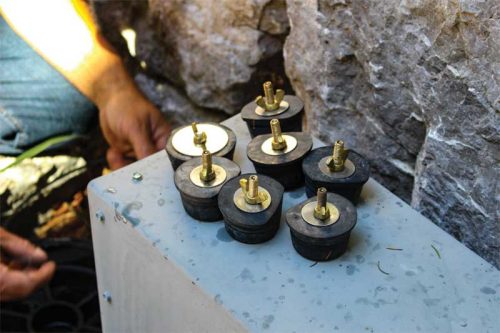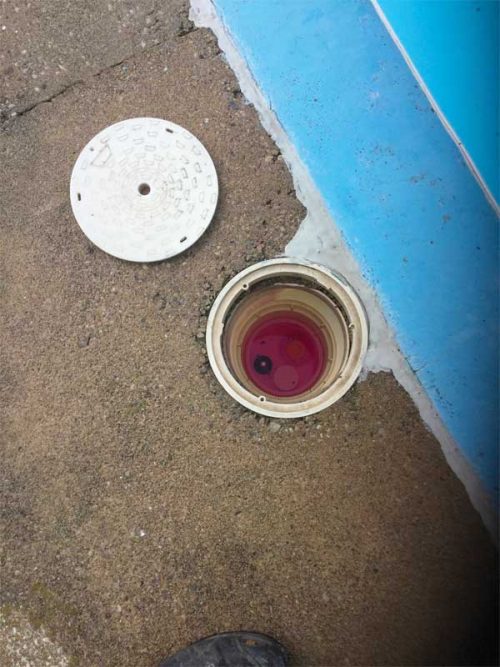Chemical controllers

If the client’s pool is equipped with an automatic chemical controller, it needs to be disconnected and cleaned. The unit’s probes (sensors) need to be submerged in water and stored in a warm indoor environment. Further, the chemical feeders’ pumps need to be disconnected and cleaned with water before storing them over the winter.
Install the safety cover
There are different ways a pool can be covered for the winter. Installing a cover can prevent damage to the pool, as well as help control staining by keeping external debris out and maintaining the water level and chemicals in the pool.
The best option for the client is a winter safety cover as they are very durable. Further, their mesh construction allows rainwater and melting snow to pass through, but not dirt. They also block sunlight, which inhibits algae growth. They are called safety covers because they can be walked on without the risk of entrapment, which makes them a great option for clients who have kids and/or pets.
Depending on the fabric and brand of the safety cover the client chooses it may come with an extended warranty of two or more years. While they are a larger upfront investment, they are easier to install each winter and stand the test of time. These covers, opposed to a tarp and water bags, are more esthetically pleasing in the backyard—especially when they are installed for six to eight months of the year.
Tarps are relatively cost-effective and will keep sunlight and debris out of the client’s pool; however, when it comes time to open the pool in the spring, these covers can be a lot of work for a pool opening crew to remove. They will hold dirt, debris, and leaves, which makes them incredibly difficult to take off the pool without spending extra time pumping water off the cover and removing the debris. These covers can also become an eyesore for many homeowners when looking at them over a long winter. Further, they do not offer any safety benefits.
Surprisingly, covering a pool over the course of winter is actually not a necessity—especially large commercial pools. In fact, many of these facilities do not use an outdoor cover. In the spring, large trash pumps are used to remove the mud, leaves, twigs, and other debris that may have accumulated over the winter.
It is all in the details

Closing a pool is a lot more critical and complicated than the opening process; therefore, if it is done incorrectly, it can become a very costly mistake. That said, it should be recommended to clients they work with the same company to perform their pool closing and opening. This ensures consistent workmanship and peace of mind for the homeowner as their service professional is familiar with their pool and knows their equipment inside out.
Keep in mind, following this method means the responsibility—if an error has been made during closing—falls on the hired company. Service companies should follow these closing tips and ensure its closing/opening crews are well-trained. That said, if a homeowner or facility operator decides to open the pool themselves and realize there is winter damage, the company that was hired to close the pool is not likely to take responsibility. It is the responsibility of the homeowner/facility operator to perform due diligence when hiring a company.
Experienced pool technicians should understand what items need to be secured from vandals, as well as what items need to be protected from weather (e.g. moisture and freezing) over the course of the off-season. Some of the off-season issues pools face include: damage to equipment and materials from rust, cold, dampness, condensation, weather conditions, ultraviolet (UV) rays, rodents, and insects. To this end, pool service companies should be prepared to offer their clients with a complete list of services and chemicals included in the closing.
When it comes to shutting pools down for the winter knowledge is essential. For example, if a technician is not aware of the hydrostatic relief valve in the client’s pool, and there is a high groundwater pressure, the shell can pop up and out of the ground. Therefore, a pool company with an experienced seasonal maintenance team is not only important to ensuring the longevity of clients’ pools and equipment, but also eliminating any potential headaches and added expenses.
 Mark Elliott is the vice-president of construction for Acapulco Pools in Kitchener, Ont. He has dedicated nearly 15 years to the company and oversees all aspects of the construction process, including purchasing, construction services, and project management to ensure all installations are completed on time and within budget. He can be reached via e-mail at mark@acapulcopools.com.
Mark Elliott is the vice-president of construction for Acapulco Pools in Kitchener, Ont. He has dedicated nearly 15 years to the company and oversees all aspects of the construction process, including purchasing, construction services, and project management to ensure all installations are completed on time and within budget. He can be reached via e-mail at mark@acapulcopools.com.
 With an extensive background in aquatics, Codi Keller has the knowledge and experience needed to answer technical questions and address aquatic issues promptly and accurately. She is responsible for co-ordinating the Acapulco Pools service department, including troubleshooting, scheduling technicians, and order processing. She can be reached via e-mail at codi@acapulcopools.com.
With an extensive background in aquatics, Codi Keller has the knowledge and experience needed to answer technical questions and address aquatic issues promptly and accurately. She is responsible for co-ordinating the Acapulco Pools service department, including troubleshooting, scheduling technicians, and order processing. She can be reached via e-mail at codi@acapulcopools.com.






